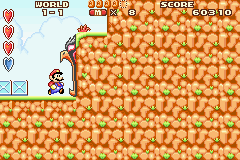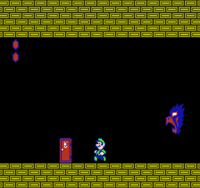Mask Gate: Difference between revisions
TheRaoul1992 (talk | contribs) |
TheRaoul1992 (talk | contribs) |
||
| Line 25: | Line 25: | ||
==Gallery== | ==Gallery== | ||
<gallery> | <gallery> | ||
DDP Mask Gate sprite 2.png|''[[Yume Kōjō: Doki Doki Panic]]'' | |||
DDP Mask Gate Enemy.png|''Yume Kōjō: Doki Doki Panic'' (enemy) | |||
SMB2 Hawkmouth sprite.png|''[[Super Mario Bros. 2]]'' | |||
SMB2 Hawkmouth sprite 2.png|''Super Mario Bros. 2'' | |||
Hawkmouth SMB2 Sprite.png|''Super Mario Bros. 2'' (enemy) | Hawkmouth SMB2 Sprite.png|''Super Mario Bros. 2'' (enemy) | ||
Mask Gate SMAS SMB2.png|''[[Super Mario All-Stars]]'' | Mask Gate SMAS SMB2.png|''[[Super Mario All-Stars]]'' | ||
SMAS SMB2 Mask Gate Enemy.png|''Super Mario All-Stars'' (enemy) | SMAS SMB2 Mask Gate Enemy.png|''Super Mario All-Stars'' (enemy) | ||
Mask Gate SMA sprite.png|''Super Mario Advance'' | Mask Gate SMA sprite.png|''[[Super Mario Advance]]'' | ||
SMA Mask Gate Enemy.png|''Super Mario Advance'' (enemy) | |||
</gallery> | </gallery> | ||
Revision as of 17:12, March 3, 2021
Mask Gates,[1][2] also known as masks,[3] and Birdfaces[4], are eagle-head gates that appear at the end of every level in Super Mario Bros. 2, its remakes in Super Mario All-Stars and Super Mario Advance, and its original version, Yume Kōjō: Doki Doki Panic.
History
Yume Kōjō: Doki Doki Panic / Super Mario Bros. 2
Mask Gates first appear in Yume Kōjō: Doki Doki Panic, where they resemble a tribal mask instead of a raptor head. They are reminiscent to Phanto or the smaller masks that were replaced by Mushroom Blocks. Its design was altered to that of a raptor's in its overseas localization, Super Mario Bros. 2.
In both games, Mask Gates are attached to the wall at the end of a level. A Mask Gate allows the player to move on to the next level, or to the world's boss if the current level is the last level of the world. To open a Mask Gate, the player must pick up a Crystal Ball, which is either placed out in the open or guarded by Birdo.
All Mask Gates are harmless to the player, except for one, which appears in Wart's Castle, more specifically World 7-2. By picking up the Crystal Ball, the Mask Gate detaches itself from the wall and then chases the player around in a similar manner to Phanto. It takes away a small heart from the player upon contact. The player must attack the Mask Gate by throwing Mushroom Blocks in the vicinity; after throwing three Mushroom Blocks at it, the Mask Gate is temporarily stunned, allowing entry into Wart's throne room. However, if the player does not enter into the Mask Gate while it is stunned, it eventually reanimates itself again.
Appearances in other media
A Mask Gate appeared in the episode "Too Hot to Handle" of The Super Mario Bros. Super Show!. Although King Koopa leaped into the Mask Gate at the climax of the episode to make his getaway; it appeared to be inanimate and was made of metal.
Mask Gates made several appearances in the Nintendo Comics System's Super Mario Bros. comics, functioning much like Warp Pipes.
A Mask Gate has appeared in volume 8 of Super Mario-Kun. This Mask Gate is similar to the one near Wart's Castle because it starts attacking when Mario tries to enter through it. As in the games, Mario throws a Mushroom Block to have it allow him, Luigi, and Yoshi to enter Wart's Castle.
Gallery
- DDP Mask Gate sprite 2.png
- SMB2 Hawkmouth sprite.png
- SMB2 Hawkmouth sprite 2.png
Super Mario Bros. 2
- Hawkmouth SMB2 Sprite.png
Super Mario Bros. 2 (enemy)
Names in other languages
| Language | Name | Meaning | Notes |
|---|---|---|---|
| Japanese | 仮面[5] Kamen マスクゲート[6][7] Masukugēto |
Mask Mask Gate |
|
| Chinese (simplified) | 老鹰嘴通道[8] Lǎoyīng Zuǐ Tōngdào |
Eagle Beak Passageway | |
| German | Falkentor[?] | Falcon Gate |
References
- ^ Super Mario Bros. 2 Inside Out, Part I. Pages 8 and 34.
- ^ Super Mario Bros. 2 Inside Out, Part II. Page 32.
- ^ "At the end of each area, there is a mask that becomes a gate to the next area." - Super Mario Bros. 2 NES instruction booklet, page 22.
- ^ Nintendo Power Advance V.1, page 39.
- ^ Yume Kōjō: Doki Doki Panic instruction booklet, page 28.
- ^ Shogakukan. 「スーパーマリオコレクション任天堂公式ガイドブック」 (Super Mario Collection Nintendo Kōshiki Guidebook). Page 154.
- ^ Shogakukan. 2015. Super Mario Bros. Hyakka: Nintendo Kōshiki Guidebook, Super Mario USA section, pages 68 and 70.
- ^ iQue's promotional demo play videos of Super Mario Advance and Wario Land 4. Retrieved September 4, 2020.




